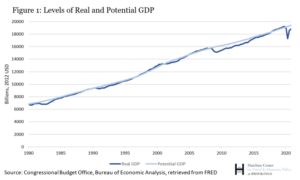This post is part of a series about a discussion (framed as a debate) between Gillian Tett and Yanis Yaroufakis on the subject of saving capitalism. If you found this post via an Internet search, it probably makes sense to start with the first post in the series, the link to which can be found above, and here.
Does saving capitalism need us to move away from share markets?
To pick up where the prior post left off, Yanis makes the statement that financial markets are so disconnected from the real economy that the idea of going back to a capitalism that works is now impossible.
That the concentration of power is so gigantic these days that the “umpires”, the regulators, will always be “captured” by the powerful corporations.
That if we really want competition, and freedom, and liberalism, to have a chance, we need to move away from share markets and go to a system where the capital to expand existing businesses and fund new businesses comes from savings.
Yanis claims Adam Smith supports this idea, and that Adam Smith was totally against public limited companies because he understood that “liquid ownership” or what we call securitized ownership, where the ownership of firms are sliced up and traded anonymously as shares, destroys what he (Smith) saw as prerequisites for well functioning competitive markets.
Gillian asks why we wouldn’t go to a system of asset management funds representing people (automatic enrollment in pension funds for example) providing the “fuel” for investing in companies, combined with “radical digital transparency” so people can track what companies are doing, and express their ideas through votes if they want to?
Yanis said this is because the pension funds themselves are being taken over by the institutions that happen to have a greater percentage of ownership.
He points out that three big firms control 90% of the New York stock exchange.
Gillian asks why not work on reforming the pension funds, getting better financial oversight and regulation, and working with a system that actually sparks innovation and growth, rather than aspires to something that has never actually materialized ever, anywhere in the world on any scale effectively.
Yanis responds by saying that capitalism never materialized anywhere in the world until it did, and furthermore, capitalism is already evolving out of itself, whether we like it or not.
He proposes that his idea for this new system, where each employee gets one share and one vote on major decisions, kills the concentration of power.
Anne steps in to support Yanis’s criticisms of the failure of regulators to deal with high concentrations of corporate power.
Gillian then talks about how Adam Smith got the whole “barter preceded and necessitated the invention of money” thing wrong and segues this into an interesting idea.
She mentions David Graeber’s book “Debt: The First 5,000 Years” (which is an excellent book by the way) and then states that barter, debt, and money co-existed in primitive societies.
However, when I read that book, I saw David Graeber make references to “the mythical land of barter” and I recall him saying barter was never done within communities, but rather only between communities.
She then goes on to make a VERY interesting point about the basic business model of Silicon Valley. She refers to “the wholesale swap of data for services” which is the bedrock of much of the tech sector today, does not involve money, and is considered to be “free”.
We tend to look at how tech companies take and use our data, and we don’t tend to look at the services side of this.
She claims this exchange of data for services IS barter and is a form of barter where the users of these services have less power.
She recommends we change the rules of this barter exchange to give users more power.
Specifically:
- More transparency about how data is being used.
- More transparency about what the company does with your data once they have it.
- And most crucially (and this is a market based solution) data portability, such that when a user can pull their data out of any tech company and take that data somewhere else, we would have the beginnings of a proper market where users have some leverage.
She claims this will create competition that will give consumers power, and she further claims we already have a model for this “transportability” and it’s called “finance”.
If you change your bank account today, the bank is responsible to ensure your money goes from one bank to the other, it’s not on you as a depositor.
She states we need “data portability” within tech companies, modelled after “money portability” within the banking system, along with better antitrust regulation.
She claims this is how we best make competition and consumer power matter in tech.



